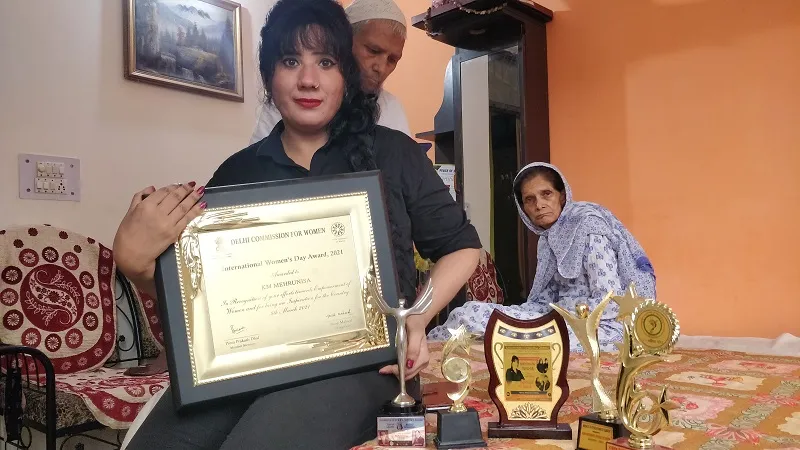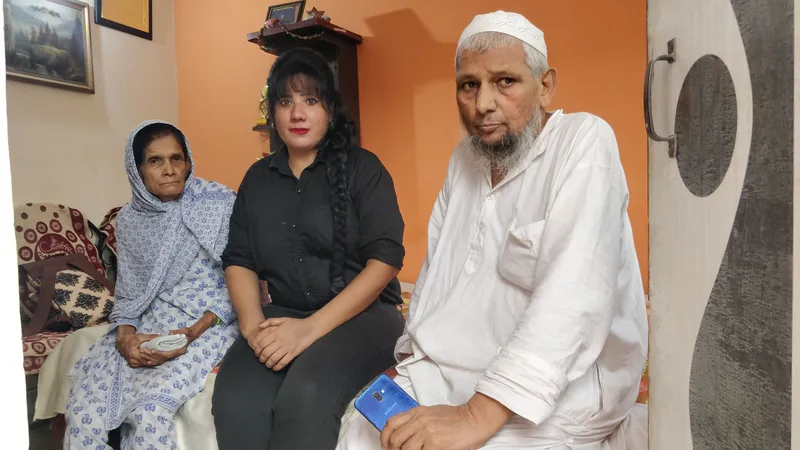Women in black: what one-and-half years of no work means for female bouncers in Delhi
The growing need for women bouncers to safeguard women thronging restaurants and bars has come to a halt with such places hardly opening due to lockdowns and strict restrictions, following the pandemic.
“I am still waiting for my bosses at Hauz Khas Social to call me back to work. They’ve assured me that they will, but it’s been so long that I am losing out on patience now,” says Mehrunissa Shaukat Ali, the female bouncer at one of the capital’s most popular hangouts.

India's famous bouncer Mehrunissa Shaukat Ali with her awards as her parents shadow her.
(Pic credit: Poorvi Gupta)
I first met Mehrunissa in 2015 when I had gone clubbing at the South Delhi pub. Dressed in an all-black outfit, she was stationed in one corner of the bar with hands firmly resting on her waist. She exuded a strict personality ready to ward off unruly drunk patrons from the club. Her confident kohl-rimmed eyes struck me instantly and I asked her for an appointment to interview her for a publication. Since then, the 35-year-old has been featured by almost every prominent media house in the country so far that claims her to be India’s first female bouncer.
Yet, despite all the fame, she has been jobless since March 22, 2020 when the nationwide lockdown was announced for the first time after the coronavirus pandemic hit India.
Apart from her job at Social, Mehrunissa also took up independent assignments for weddings and providing security to celebrities like Priyanka Chopra, Priety Zinta, Vidya Balan, etc during events. While she was making around Rs 40,000 – 50,000 per month, her independent assignments also dried up due to the pandemic.
She lives with her ageing parents, two sisters and three children of her elder sister in the slums of Khanpur area. Her younger sister Tarannum is now the family’s only breadwinner who has taken up an accounting job in a private firm. Mehrunissa’s contributions largely depended on the rewards she received during the pandemic including an award and an honorarium of Rs 10,000 from the Delhi Commission of Women on International Women’s Day this year, among others.
Facing the wrath of the virus

Mehrunissa with her mother Shashi Kala Mishra aka Shama Parveen (after marriage) on her right and father Shaukat Ali on her left. (Pic credit: Poorvi Gupta)
While Mehrunissa is a popular name in the security industry, thousands of women bouncers who joined the industry for its gender-specific benefits are ravaged by the pandemic. The growing need for women bouncers to safeguard women thronging restaurants and bars has come to a halt with such places hardly opening due to lockdowns and strict restrictions.
National-level kabaddi player Pooja Trivedi* worked as a Physical Education teacher in a private school during the day and bouncer at night. But she lost both her jobs during the pandemic. Despite being qualified to work as a sports teacher, she loved her job as a bouncer at a Noida bar.
“I really enjoyed working as a bouncer – to think that in today’s life, even women can guard women. It was about equality that if men can go to clubs at night, so can women and they should feel safe while at it,” says Pooja who started working as a bouncer in 2012.
For Pooja, one of the most difficult things has been to adjust to a home-based life as she has been a workaholic all her life. “Since the first lockdown was imposed and I lost all sources of livelihood, my children’s education has been impacted the most. I had to remove my daughter from a CBSE-affiliated school in New Delhi and get her admitted to a UP-board school in Noida because the fee is less. My mother, who is an Anganwadi worker, also helped me financially for a few months,” she adds.
Currently, Pooja is frantically looking for a job, but all her efforts are in vain.
Silver lining of the profession
Women with limited education were increasingly taking up bouncer jobs in the pre-pandemic world because of its high-paying nature. In most cases, women bouncers were paid around Rs 1,500 – Rs 2,000 per shift along with conveyance while their male counterparts made around Rs 800 – Rs 1,200 for the same shift.
This is exactly why Harpreet Kaur – who shifted from Amritsar to Delhi in search of better livelihood prospects – started working as a bouncer around two years ago when her family battled a financial crunch. But her job didn’t last long as she ran out of work because of the pandemic.
Thirty-eight-year-old Harpreet Kaur on-duty in a private firm in Noida before the pandemic cost her job.
“I was looking for a job in 2019 that would pay me well but didn’t require high qualification as I am only a high school graduate. That’s when I found that women also work as bouncers and if you are fit, look intimidating and bold then you can be employed as one,” says Harpreet, who worked as a bouncer in an Ola office in Noida.
But one of Delhi’s coveted security agencies, Denetim Services employs only around 40-45 women bouncers out of a total of 400 bouncers and bodyguards.
“Male bouncers are preferred over women because women bouncers mostly depend on their fitness to defend their client while male bouncers are armed. We recruit ex-army men who already have licenses to use guns but it’s not the same with women. We know that the percentage of women in combat roles in the army is poor and hence, most women recruited in security work lack licenses to use and keep a weapon,” says Shyam Bhardwaj, Senior Deputy Head & Management at the company.
Gig economy on a fall
Bouncers are a niche part of the larger gig economy and informal sector with no trade union or community to safeguard their dwindling employment. While the entire security industry is hit due to the pandemic and the economic slump, women have suffered more job losses than men.
The Centre for Monitoring Indian Economy data reveals that between March 2020 – April 2020 26.6 percent of the female workforce moved out of the labour force as opposed to 13.4 percent of men. Despite the lockdown being lifted after August, the size of the female labour force continued to be 14 percent lower in December 2020 than in December 2019.
Economist Ritu Dewan sheds light on why women’s work in the informal sector particularly in the security industry has gone redundant.
She says, “The pubs and restaurants that employ bouncers are all closed due to the lockdown. Additionally, women’s footfalls in pubs have also gone down because of the work-from-home scenario and the increase in unpaid work and caregiving work at home. Therefore, pubs that had employed women bouncers earlier to safeguard their female clientele suddenly didn’t require them anymore.”
She adds, “Whenever there is a job competition, the women primarily lose out big time and this is true for women across sectors.”
India’s Female Labour Force Participation Rate (FLFP) has fallen to its historic low of 23.3 percent against 55.9 percent men’s participation as per the National Sample Survey Office (NSSO) report of 2017-18.
Jayati Ghosh, Economist, and Professor at Jawaharlal Nehru University, also comments on the fall of women in the informal sector. She says, “Women’s participation was already declining in the workforce which is a huge global tendency that whenever there is a shortage of jobs, women get squeezed out. In India, the decline is sharper than in most other countries because our economy has also suffered more. Within the broader general pattern, particular sectors have been adversely affected. Therefore, women bouncers have lost their jobs disproportionately.”
The COVID-19 pandemic and the resultant lockdowns have not only devastated India’s economy but also killed the aspirations and opportunities of millions of women who had found agency and authority in a patriarchal society – in terms of their financial independence cutting across class and gender barriers. By putting such a large percentage of women out of work, it has been proved yet again that women suffer disproportionately in times of crisis.
*Names changed upon request
(Edited by Amrita Ghosh)
This story is part of the Laadli Media Fellowship - A Population First initiative supported by UNFPA. It was first published on Aug 10, 2021 on MAKERS India but after Yahoo! shut its media operations in India on August 26, 2021, it is being republished on HerStory.








